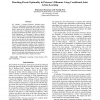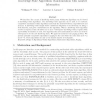107 search results - page 14 / 22 » When Random Play is Optimal Against an Adversary |
AAMAS
2007
Springer
13 years 7 months ago
2007
Springer
We consider a repeated Prisoner’s Dilemma game where two independent learning agents play against each other. We assume that the players can observe each others’ action but ar...
STOC
2004
ACM
14 years 7 months ago
2004
ACM
We present a probabilistic analysis for a large class of combinatorial optimization problems containing, e.g., all binary optimization problems defined by linear constraints and a...
CORR
2011
Springer
12 years 11 months ago
2011
Springer
In studying how to communicate over a public channel with an active adversary, Dodis and Wichs introduced the notion of a non-malleable extractor. A non-malleable extractor dramat...
ALGORITHMICA
2011
13 years 2 months ago
2011
We introduce the concept of knowledge states; many well-known algorithms can be viewed as knowledge state algorithms. The knowledge state approach can be used to to construct comp...
IWSEC
2009
Springer
14 years 2 months ago
2009
Springer
Abstract—Password-authenticated key exchange (PAKE) protocols are designed to be secure even when the secret key used for authentication is a human-memorable password. In this pa...


